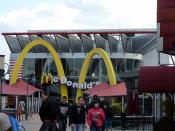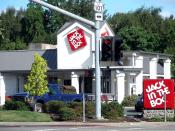The future of McDonald'sAmerica's love affair with fast food has hit a rocky patch and there is litigation in the air. Nutritionists warn us about trans-fats and super-sizing our way to obesity. Something is not right in the drive-thru, our transport to a half-century of low-cost, high-calorie, turned-on-a-dime comfort food.
As Americans get fatter, and critics look for culprits among peddlers of cheeseburgers and chicken fingers, the nation may be about to engage in a culinary transformation. What is the future of fast food? Will our passion for French-fries fade as we learn to eat smarter? Will the chains reinvent themselves through menus that an increasingly health conscious public can live with? Or will we continue to spend more than $110 billion a year on food that health expert's say is slowly killing us?So what will Americans want to see on the McMenu of the future? Most new items are in development for as much as two years, so any real change will be gradual.
And no one is predicting the demise of fast food, even if McDonalds does offer healthier items, they still must deal with the critics' top complaint super-sizing, or offering a lot more of an item for a minimal increase in price. Since industry's biggest cost is labor, that extra few cents is nearly pure profit. So while doing things like using healthier oils is a step in the right direction, it doesn't solve the problem (McDonald's Corporation, 2007). Four years ago, the chain became a major investor in Denver-based chain Chipotle Mexican Grill, known for its fresh handmade burritos. Chipotle serves free-range pork from Niman Ranches, which supplies America's top restaurants with quality meats raised on family farms. McDonald's' involvement with Chipotle, says Bill Niman, is an indication that fast food will gradually reflect America's...


